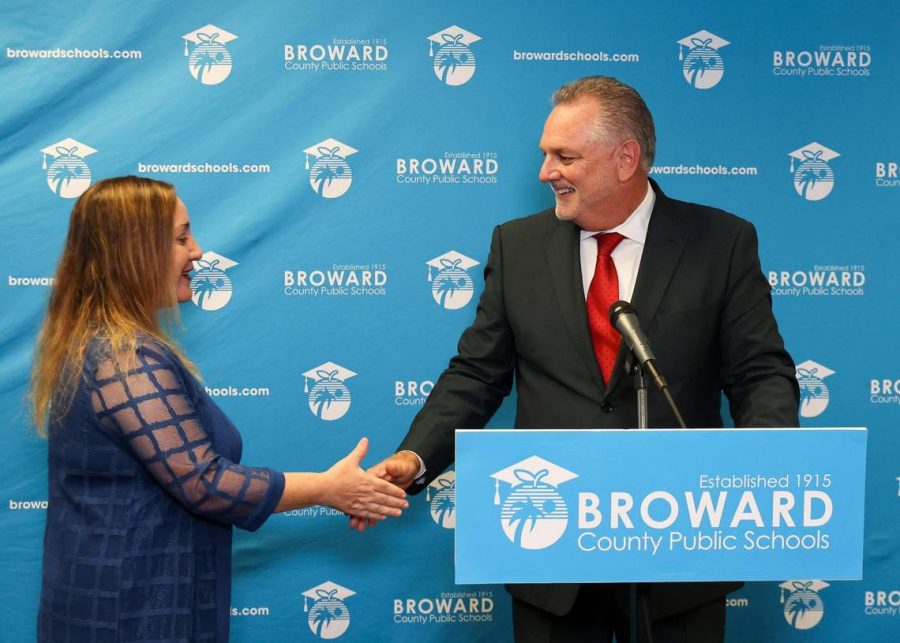Tribune News Service
Broward School Board chair, Lori Alhadeff, District 4, left, shakes the hands of Peter Licata, right, after the board voted 7-2 to name him its new superintendent, Thursday, June 15, 2023, inside the School Board room at Kathleen C. Wright Building in Fort Lauderdale, Florida. Photo permission from Carl Juste/TNS.
Florida act proposes changes to State Constitution to create partisan elections on school boards
House Joint Resolution 31 was enrolled on April 19 in the Florida House, proposing partisan elections for Florida school boards. The joint resolution would require school board candidates to run under a political party starting in the 2026 school board election if voters pass the resolution with 60% approval in the 2024 election.
With 79 Yeas-34 Nays in the Florida House chamber, the resolution was filed and sent to the Florida Senate chamber; the order was enrolled on April 19 in the Florida Senate chamber with 29 Yeas-11 Nays.
“All of these races are partisan now,” Gruters said according to an article by Florida Politics. “We’re just pulling the bag off of people’s heads and allowing people full knowledge of where people stand.”
At the same time, another move was made on district school boards; HB 477, which further limits terms for district school board members to eight years, was approved by the governor. Last year, a law was enacted to limit school board member terms to 12 years.
While Republican legislators have largely been avid supporters of HJR 31, other legislators and government figures around Florida have spoken out in opposition, including past and present district school board members.
Although there is pushback from adversaries, advocates of similar decisions push that the type of legislation provides more “transparency,” stated by Republican Indiana state Rep. J.D. Prescott, and gives voters “more information,” declared GOP Montana state Sen. Greg Hertz. This type of legislation isn’t the first of its kind, and may not be the last.
In a day-in-age where politics have been polarized due to electoral tensions, people tend to only look at candidates from their political party. According to the American Political Science Review, only 3.5% of voters are willing to vote against their favored candidate because of undemocratic behaviors.
Additionally, approximately 70% of both Democrats and Republicans in 2022 have negative stereotypes against the other party such as close-mindedness, dishonesty and immoral character traits, as stated in a Pew Research Center chart. Such statistics raise concerns about the morality of voters and if allowing them to see candidate’s parties would lead to them making the best decision on electing candidates, who would be making impacts on schools all across each district.
“I think it would impact my job by having colleagues up on the dais that could be focused on political agenda rather than focusing on the best interest of students in Broward County Public Schools,” Alhadeff said.
The resolution wouldn’t just affect the representatives on the board, but it would shape what schools could look like for students. Some current students at Marjory Stoneman Douglas High School have strong opinions on this bill.
“I personally think it’s ridiculous; whether you’re a Democrat or Republican, that should not be the only influence to your decisions nor should it be the main factor, especially when it comes down to education,” junior Cianna Furton said. “At a certain point, it turns education and children into a political tool, and if you’re going to vote off of party affiliation and not plans of actions or morals, then are you truly voting for who you think is best? Or are you just voting for someone because of a false sense of loyalty?”
While HJR 31 passed to the Secretary of State for review, it is officially an act and will be put on Florida’s 2024 ballot; requiring a minimum of 60% of voters to vote in favor of the Act for it to take effect. If the legislation were to be approved, Florida would join nine other states in having legislation requiring or giving the choice of partisan school board elections.
The bill’s fate is now in voters’ hands to decide, and the outcome remains to be seen.
